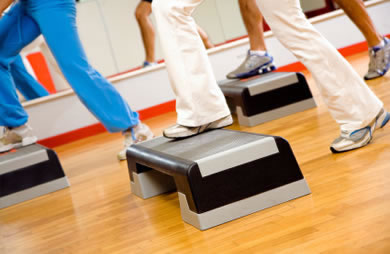With the combination of warm sunshine, crisp temperatures and lush new growth, it's no wonder spring is prime marathon season. The popularity of marathons continues to grow: According to Running USA's Annual Marathon Report, there has been a 40 percent increase in U.S. marathon and half-marathon finishers over the past decade. If you're planning a spring race like we are, you're (hopefully) right in the thick of your training program. Heading into these final few weeks, it's important to avoid injury, stay motivated and keep your eyes on the prize.
To help you through the home stretch, we asked some seasoned runners what they wish they'd known before completing their first race (and I threw in a few thoughts of my own). You don't have to be in marathon territory to benefit from their insights: Whether you're training for your first 5K, going for the popular half marathon or ramping up for the the main 26.2-mile event, these words of wisdom will help you gear up and stay the course.
#1. Your body needs more fuel than you think.
Just as a car won't function at optimal capacity if it's using the wrong type (or not enough) gas, a long-distance runner is destined to hit the proverbial wall without the right fuel. If you don't feel particularly thirsty, it's easy to mistakenly assume you can skip the water stops. You might be able to get away with breezing by if you're running a shorter 5K or 10K race, but the longer courses require frequent and thoughtful hydration.
Massachusetts runner and blogger Dan Mees, currently training for his third marathon, stresses the importance of water for racing success. "Stop at every water or Gatorade stop, whether you think you need it or not. And don't run through those stations trying to be a hero while spilling half the liquid on your shirt that should all be going in your mouth. Making these multiple stops, which amounted to several quick breaks along the way, helped me finish the race strong. I ran my last mile the fastest."
Mees also suggests bringing your own energy gels instead of assuming they'll be readily available whenever you need them. "While they may be offered throughout the course, you really need to pop a gel every 45 minutes (plus one before the race)," Dees recommends. "GU is a great way to go. They really work."
#2. It's never a good idea to try something new on race day.
Dr. Bob Wilson, an ER doctor and avid marathoner, often doles out this piece of advice to his running patients. Whether it's a cute new tank you picked up at the pre-race expo, a brand-new pair of running shoes or a brand of energy gels someone recommended, race day isn't the time to experiment. Testing something for five minutes gives no indication of how it will perform or how your body will react to it for the duration of the race. By sticking with the routine that has carried you through your longest training runs, you'll minimize the chances of unwelcome surprises.
#3. You're probably carrying tension in your shoulders.
Even non-runners tend to scrunch up their shoulders slightly, and this tension tends to worsen during races and training runs. This can lead to shoulder pain, numb hands and other undesirable effects.
Dr. Patrick Labelle, a Chicago-based Board Certified Chiropractic Sports Physician for BioMechanics and a six-time marathoner himself, says shoulder tightness is the most common complaint he hears from long-distance runners. Labelle notes two main causes for this: Poor posture, likely caused by countless hours hunched over computers and phones, and the body's natural stress response to long-distance runs.
"Long training runs are stressful for your body, and stress activates a slew of hormonal and neurological responses," Dr. Labelle says. "One of the automatic stress responses is to curl into the fetal position. You’ll notice this while running, as your hands clench, your elbows bend to more than 90 degrees and/or your shoulders are magnetically drawn up toward your ears."
To prevent injury and run more efficiently, this tension must be released—but how? Dr. Labelle suggests using this five-step exercise to improve running posture and send a signal to the body that you aren't under dangerous stress:
1. Take a normal breath.
2. As you exhale, try to push your head up to the sky.
3. Maintain that new, higher head position when you inhale.
4. Repeat as needed.
5. Say “ahhhhhh…” as the tension leaves your neck and shoulders.
#4. The journey is more important than the destination.
For a first-time marathoner, there is often a great deal of anxiety surrounding the main event—but seven-time marathoner and Chicago fitness coach Samantha Kellgren asserts that by the time race day arrives, the hard part is behind you.
"Although a marathon isn’t short, relative to the time and miles you put in during your training, it goes by fast," Kellgren says. "I don’t listen to music during races so I can take it all in. I paid and trained to run with others, to see a new course and to experience the entertainment and spectators. When it gets tough, just think, 'in 10 miles, all of this will be a memory.' Soak up every aspect of it, both good and bad."
Mees agrees that the journey trumps the destination. "Every first-time marathoner worries about making it across the finish line," he says. "If you trained well, you will finish, so don't stress out about that. Instead, smile at everyone along the way, say thank you to the volunteers and soak in the atmosphere." When he reflects on his first marathon (the Vermont City Marathon in Burlington), Mees doesn't mention the finish line. Instead, his memories include the encouraging crowds, the kids in the neighborhoods handing out ice pops, and the Asian drum corps providing rhythmic motivation during the big hill at mile 16.
Obviously, it's ideal to finish as quickly as possible, but if you're running a new distance for the first time, focus more on completion than the clock. Jen Miller, a seasoned New Jersey marathoner and author of Running: A Love Story, stresses that you shouldn't base a goal pace on previous, shorter races. "Don't have a time goal (for your first marathon), even if you've run a half marathon before," Miller says. "You can't just double your time from the half and make that your marathon goal. Your body can react in very different ways to a full than a half. Just finishing is golden."
#5. Pre-race meals can make or break your experience.
Eating too much, too little or the wrong foods in the hours leading up to a race can wreak havoc on your performance. Play around with different foods prior to your long training runs, so you'll know what your body will and won't tolerate.
Mees says he often had anxiety about what to eat and drink before his races. "I think the traditional carb loading the night before is a good tactic, but don't eat so much pasta that you have a stomachache and can't sleep," he recommends. "A beer or a glass of wine the night before won't hurt either, but stick to one. Also, getting up a couple hours before race time and having a bagel with peanut butter and a banana does help. Don't stuff yourself, but you need to eat and you need to drink in advance of the race."
Michelle Mudge-Riley, an osteopathic physician and licensed dietician, has run nine marathons. "I wish I would have known how important it is to eat right and to know what your food sensitivities are," she says. "Mine are gluten, wheat and apples, so the traditional advice about carb loading actually worked against me if I ate traditional pasta and bread. After figuring out my food sensitivities and low vitamin D levels, my times improved so much and I felt so much better."
#6. The day after will be brutal.
In the hours after finishing my first (and only) full marathon, I felt surprisingly good. Shaky and tired, but good. I walked around, went out to dinner in my race shirt and rehashed the race with friends and family. The next morning was another story. Once the adrenaline had worn off and my body had a chance to protest the demands I'd placed on it, the pain and fatigue sidelined me to the couch for the entire day.
Later, I learned that following proper recovery procedures could have alleviated a lot of that post-race agony. In Runner's World magazine, exercise physiologist Steve Magness recommends the following post-marathon recovery tactics: Eat a protein-rich diet to repair torn muscles, get plenty of sleep and keep moving to alleviate tightness and soreness. (He offers more running insights in his book, The Science of Running.)
#7. It's okay for it to get tough.
Kellgren mentions one of her favorite quotes: "You didn’t train so it would be easy, you trained so you could handle it when it got tough." If completing a marathon (or a race of any distance) was a piece of cake, everyone would do it.
Don't underestimate the mental aspect of running. "Yes, the physical training is what you’re focused on, but take the time to train your brain to get you through the tough parts," Kellgren says. She recommends reading a few articles on sports psychology to help prepare you to handle the mental struggle of pushing yourself past perceived limitations.
"The key to running a successful race is to meet the struggle head-on and with confidence," says Kellgren. "After all, this is exactly what you trained for.”






















.png)
